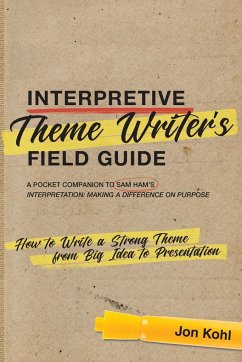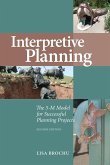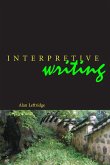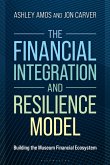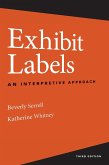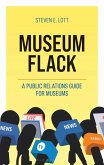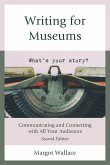Jon Kohl
Interpretive Theme Writer's Field Guide
How to Write a Strong Theme from Big Idea to Presentation
Jon Kohl
Interpretive Theme Writer's Field Guide
How to Write a Strong Theme from Big Idea to Presentation
- Broschiertes Buch
- Merkliste
- Auf die Merkliste
- Bewerten Bewerten
- Teilen
- Produkt teilen
- Produkterinnerung
- Produkterinnerung
Interpretive Solutions will help you harness the power of interpretive communications to improve critical resource protection issues and situations. Matching the right communications approach with the audience most in need of being reached can play a pivotal role in whether a situation stabilizes, improves, or worsens.
Andere Kunden interessierten sich auch für
![Applied Interpretation Applied Interpretation]() Doug KnappApplied Interpretation96,99 €
Doug KnappApplied Interpretation96,99 €![Interpretive Planning Interpretive Planning]() Lisa BrochuInterpretive Planning32,99 €
Lisa BrochuInterpretive Planning32,99 €![Interpretive Writing Interpretive Writing]() Alan LeftridgeInterpretive Writing27,99 €
Alan LeftridgeInterpretive Writing27,99 €![The Financial Integration and Resilience Model The Financial Integration and Resilience Model]() Ashley AmosThe Financial Integration and Resilience Model152,99 €
Ashley AmosThe Financial Integration and Resilience Model152,99 €![Exhibit Labels Exhibit Labels]() Beverly SerrellExhibit Labels87,99 €
Beverly SerrellExhibit Labels87,99 €![Museum Flack Museum Flack]() Steve LottMuseum Flack101,99 €
Steve LottMuseum Flack101,99 €![Writing for Museums Writing for Museums]() Margot WallaceWriting for Museums40,99 €
Margot WallaceWriting for Museums40,99 €-
-
-
Interpretive Solutions will help you harness the power of interpretive communications to improve critical resource protection issues and situations. Matching the right communications approach with the audience most in need of being reached can play a pivotal role in whether a situation stabilizes, improves, or worsens.
Produktdetails
- Produktdetails
- Verlag: National Association for Interpretation
- Seitenzahl: 170
- Erscheinungstermin: 15. November 2018
- Englisch
- Abmessung: 229mm x 152mm x 9mm
- Gewicht: 256g
- ISBN-13: 9781879931336
- ISBN-10: 1879931338
- Artikelnr.: 70398510
- Herstellerkennzeichnung
- Libri GmbH
- Europaallee 1
- 36244 Bad Hersfeld
- gpsr@libri.de
- Verlag: National Association for Interpretation
- Seitenzahl: 170
- Erscheinungstermin: 15. November 2018
- Englisch
- Abmessung: 229mm x 152mm x 9mm
- Gewicht: 256g
- ISBN-13: 9781879931336
- ISBN-10: 1879931338
- Artikelnr.: 70398510
- Herstellerkennzeichnung
- Libri GmbH
- Europaallee 1
- 36244 Bad Hersfeld
- gpsr@libri.de
Jon Kohl
Contents
Foreword by Sam Ham: "Why I agreed to support this Field Guide"
Pre-Tour Warmup: This Field Guide Originates in the 1990s
Natural-Cultural History of the Second Edition
Acknowledgments
Trailhead: This Is How You Use This Field Guide
Stop 1: The Theme that Lurks Behind Thematic Interpretation
Stop 2: We Write Themes for Primary and Secondary Audiences
Stop 3: Strong Interpretive Themes Embody Big Ideas and Vehicles to Deliver
Them
Stop 4: Interpreters Must Ignite Their Inspiration for the Big Idea, Not
Just Write It
Stop 5: The Big Idea Develops within the Audience's Mind via a Vehicle
Stop 6: Themes Are Written for and by People Growing Up
Stop 7: Construction of a Presentation Structure Begins with a Theme
Stop 8: Theme Writing Can be Individual, Team-, or Community-Based
Stop 9: Interpretive Frameworks Leverage the Power of Community for
Interpretation
Stop 10: To Be with or Not to Be with AI Theme Writing Generators, That Is
the Question
Field Notes
Suggested Answers to Exercises
Verbs for Stronger Themes and More Engaging Commentaries
Field Inventory of Strong Themes in this Field Guide
Themes of Best-selling Novels of All Time
Interpretive Theme Writer's Worksheet
Critique of Themes from Real Webinar Participants
Oh, My Box!
Field Guidelines for Interpretive Theme Writing
References
Quote Sources
Glossary
Index
Voices from the Field
1 Floating the Tigris: Harnessing the Light of Thematic Interpretation by
Shelton Johnson
2 Crafting Themes Guided by Indigenous and Traditional Culturales by Kylie
Christian and Leanne Redpath
3 Voices from the Field by Thorsten Ludwig
4 I Want to Create Brilliant Big Ideas and Compelling Themes but. by Judy
Fort Brenneman
5 A Grand Theme Doesn't Ensure a Great Program-or Even a Good One by Don
Enright
6 Themes Contribute to Traveler Transformation atop Maslow's Hierarchy of
Needs by Colby Brokvist
7 Thematic Zone of Tolerance in a Theater Setting by Angela Pfenniger
8 Tablets of Stone or Statements of Accord by Michael Hamish Glen
9 Colombia Is the First Country to Adopt the Interpretive Framework by
Clara Osorio and Carlos Rosero
10 Theme Writing: A Trail that Never Ends by Ted Cable
Theme Spotlights
Theme Spotlight Pre-Tour Warmup. Message vs. Theme
Theme Spotlight Natural-Cultural History of the Second Edition: Why
Evolution Permeates this Field Guide
Theme Spotlight Trailhead: Themes of Themes
Theme Spotlight 2.1: Secondary Themes vs. Sub-Themes
Theme Spotlight 3.1. Theme = Object + Big Idea
Theme Spotlight 3.2. Big Idea vs. Interpretive Theme
Theme Spotlight 4.1. Connecting Unlike Points to Cast New Light
Theme Spotlight 4.2. Themes Should Present an Argument
Theme Spotlight 5.1. Can a Theme Have More than One Sentence?
Theme Spotlight 5.2. Transformative Themes Tap Deep Truths
Theme Spotlight 5.3. Adding Humanity to Non-Human Phenomena
Theme Spotlight 8.1. All Three Levels Can Interact
Theme Spotlight 9.1. Historical Scan Supports Theme Identification
Foreword by Sam Ham: "Why I agreed to support this Field Guide"
Pre-Tour Warmup: This Field Guide Originates in the 1990s
Natural-Cultural History of the Second Edition
Acknowledgments
Trailhead: This Is How You Use This Field Guide
Stop 1: The Theme that Lurks Behind Thematic Interpretation
Stop 2: We Write Themes for Primary and Secondary Audiences
Stop 3: Strong Interpretive Themes Embody Big Ideas and Vehicles to Deliver
Them
Stop 4: Interpreters Must Ignite Their Inspiration for the Big Idea, Not
Just Write It
Stop 5: The Big Idea Develops within the Audience's Mind via a Vehicle
Stop 6: Themes Are Written for and by People Growing Up
Stop 7: Construction of a Presentation Structure Begins with a Theme
Stop 8: Theme Writing Can be Individual, Team-, or Community-Based
Stop 9: Interpretive Frameworks Leverage the Power of Community for
Interpretation
Stop 10: To Be with or Not to Be with AI Theme Writing Generators, That Is
the Question
Field Notes
Suggested Answers to Exercises
Verbs for Stronger Themes and More Engaging Commentaries
Field Inventory of Strong Themes in this Field Guide
Themes of Best-selling Novels of All Time
Interpretive Theme Writer's Worksheet
Critique of Themes from Real Webinar Participants
Oh, My Box!
Field Guidelines for Interpretive Theme Writing
References
Quote Sources
Glossary
Index
Voices from the Field
1 Floating the Tigris: Harnessing the Light of Thematic Interpretation by
Shelton Johnson
2 Crafting Themes Guided by Indigenous and Traditional Culturales by Kylie
Christian and Leanne Redpath
3 Voices from the Field by Thorsten Ludwig
4 I Want to Create Brilliant Big Ideas and Compelling Themes but. by Judy
Fort Brenneman
5 A Grand Theme Doesn't Ensure a Great Program-or Even a Good One by Don
Enright
6 Themes Contribute to Traveler Transformation atop Maslow's Hierarchy of
Needs by Colby Brokvist
7 Thematic Zone of Tolerance in a Theater Setting by Angela Pfenniger
8 Tablets of Stone or Statements of Accord by Michael Hamish Glen
9 Colombia Is the First Country to Adopt the Interpretive Framework by
Clara Osorio and Carlos Rosero
10 Theme Writing: A Trail that Never Ends by Ted Cable
Theme Spotlights
Theme Spotlight Pre-Tour Warmup. Message vs. Theme
Theme Spotlight Natural-Cultural History of the Second Edition: Why
Evolution Permeates this Field Guide
Theme Spotlight Trailhead: Themes of Themes
Theme Spotlight 2.1: Secondary Themes vs. Sub-Themes
Theme Spotlight 3.1. Theme = Object + Big Idea
Theme Spotlight 3.2. Big Idea vs. Interpretive Theme
Theme Spotlight 4.1. Connecting Unlike Points to Cast New Light
Theme Spotlight 4.2. Themes Should Present an Argument
Theme Spotlight 5.1. Can a Theme Have More than One Sentence?
Theme Spotlight 5.2. Transformative Themes Tap Deep Truths
Theme Spotlight 5.3. Adding Humanity to Non-Human Phenomena
Theme Spotlight 8.1. All Three Levels Can Interact
Theme Spotlight 9.1. Historical Scan Supports Theme Identification
Contents
Foreword by Sam Ham: "Why I agreed to support this Field Guide"
Pre-Tour Warmup: This Field Guide Originates in the 1990s
Natural-Cultural History of the Second Edition
Acknowledgments
Trailhead: This Is How You Use This Field Guide
Stop 1: The Theme that Lurks Behind Thematic Interpretation
Stop 2: We Write Themes for Primary and Secondary Audiences
Stop 3: Strong Interpretive Themes Embody Big Ideas and Vehicles to Deliver
Them
Stop 4: Interpreters Must Ignite Their Inspiration for the Big Idea, Not
Just Write It
Stop 5: The Big Idea Develops within the Audience's Mind via a Vehicle
Stop 6: Themes Are Written for and by People Growing Up
Stop 7: Construction of a Presentation Structure Begins with a Theme
Stop 8: Theme Writing Can be Individual, Team-, or Community-Based
Stop 9: Interpretive Frameworks Leverage the Power of Community for
Interpretation
Stop 10: To Be with or Not to Be with AI Theme Writing Generators, That Is
the Question
Field Notes
Suggested Answers to Exercises
Verbs for Stronger Themes and More Engaging Commentaries
Field Inventory of Strong Themes in this Field Guide
Themes of Best-selling Novels of All Time
Interpretive Theme Writer's Worksheet
Critique of Themes from Real Webinar Participants
Oh, My Box!
Field Guidelines for Interpretive Theme Writing
References
Quote Sources
Glossary
Index
Voices from the Field
1 Floating the Tigris: Harnessing the Light of Thematic Interpretation by
Shelton Johnson
2 Crafting Themes Guided by Indigenous and Traditional Culturales by Kylie
Christian and Leanne Redpath
3 Voices from the Field by Thorsten Ludwig
4 I Want to Create Brilliant Big Ideas and Compelling Themes but. by Judy
Fort Brenneman
5 A Grand Theme Doesn't Ensure a Great Program-or Even a Good One by Don
Enright
6 Themes Contribute to Traveler Transformation atop Maslow's Hierarchy of
Needs by Colby Brokvist
7 Thematic Zone of Tolerance in a Theater Setting by Angela Pfenniger
8 Tablets of Stone or Statements of Accord by Michael Hamish Glen
9 Colombia Is the First Country to Adopt the Interpretive Framework by
Clara Osorio and Carlos Rosero
10 Theme Writing: A Trail that Never Ends by Ted Cable
Theme Spotlights
Theme Spotlight Pre-Tour Warmup. Message vs. Theme
Theme Spotlight Natural-Cultural History of the Second Edition: Why
Evolution Permeates this Field Guide
Theme Spotlight Trailhead: Themes of Themes
Theme Spotlight 2.1: Secondary Themes vs. Sub-Themes
Theme Spotlight 3.1. Theme = Object + Big Idea
Theme Spotlight 3.2. Big Idea vs. Interpretive Theme
Theme Spotlight 4.1. Connecting Unlike Points to Cast New Light
Theme Spotlight 4.2. Themes Should Present an Argument
Theme Spotlight 5.1. Can a Theme Have More than One Sentence?
Theme Spotlight 5.2. Transformative Themes Tap Deep Truths
Theme Spotlight 5.3. Adding Humanity to Non-Human Phenomena
Theme Spotlight 8.1. All Three Levels Can Interact
Theme Spotlight 9.1. Historical Scan Supports Theme Identification
Foreword by Sam Ham: "Why I agreed to support this Field Guide"
Pre-Tour Warmup: This Field Guide Originates in the 1990s
Natural-Cultural History of the Second Edition
Acknowledgments
Trailhead: This Is How You Use This Field Guide
Stop 1: The Theme that Lurks Behind Thematic Interpretation
Stop 2: We Write Themes for Primary and Secondary Audiences
Stop 3: Strong Interpretive Themes Embody Big Ideas and Vehicles to Deliver
Them
Stop 4: Interpreters Must Ignite Their Inspiration for the Big Idea, Not
Just Write It
Stop 5: The Big Idea Develops within the Audience's Mind via a Vehicle
Stop 6: Themes Are Written for and by People Growing Up
Stop 7: Construction of a Presentation Structure Begins with a Theme
Stop 8: Theme Writing Can be Individual, Team-, or Community-Based
Stop 9: Interpretive Frameworks Leverage the Power of Community for
Interpretation
Stop 10: To Be with or Not to Be with AI Theme Writing Generators, That Is
the Question
Field Notes
Suggested Answers to Exercises
Verbs for Stronger Themes and More Engaging Commentaries
Field Inventory of Strong Themes in this Field Guide
Themes of Best-selling Novels of All Time
Interpretive Theme Writer's Worksheet
Critique of Themes from Real Webinar Participants
Oh, My Box!
Field Guidelines for Interpretive Theme Writing
References
Quote Sources
Glossary
Index
Voices from the Field
1 Floating the Tigris: Harnessing the Light of Thematic Interpretation by
Shelton Johnson
2 Crafting Themes Guided by Indigenous and Traditional Culturales by Kylie
Christian and Leanne Redpath
3 Voices from the Field by Thorsten Ludwig
4 I Want to Create Brilliant Big Ideas and Compelling Themes but. by Judy
Fort Brenneman
5 A Grand Theme Doesn't Ensure a Great Program-or Even a Good One by Don
Enright
6 Themes Contribute to Traveler Transformation atop Maslow's Hierarchy of
Needs by Colby Brokvist
7 Thematic Zone of Tolerance in a Theater Setting by Angela Pfenniger
8 Tablets of Stone or Statements of Accord by Michael Hamish Glen
9 Colombia Is the First Country to Adopt the Interpretive Framework by
Clara Osorio and Carlos Rosero
10 Theme Writing: A Trail that Never Ends by Ted Cable
Theme Spotlights
Theme Spotlight Pre-Tour Warmup. Message vs. Theme
Theme Spotlight Natural-Cultural History of the Second Edition: Why
Evolution Permeates this Field Guide
Theme Spotlight Trailhead: Themes of Themes
Theme Spotlight 2.1: Secondary Themes vs. Sub-Themes
Theme Spotlight 3.1. Theme = Object + Big Idea
Theme Spotlight 3.2. Big Idea vs. Interpretive Theme
Theme Spotlight 4.1. Connecting Unlike Points to Cast New Light
Theme Spotlight 4.2. Themes Should Present an Argument
Theme Spotlight 5.1. Can a Theme Have More than One Sentence?
Theme Spotlight 5.2. Transformative Themes Tap Deep Truths
Theme Spotlight 5.3. Adding Humanity to Non-Human Phenomena
Theme Spotlight 8.1. All Three Levels Can Interact
Theme Spotlight 9.1. Historical Scan Supports Theme Identification

